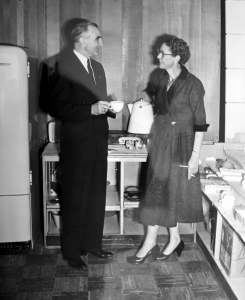
1956 Morse Campaign Picture, Series N, Box 13, Folder 19, Wayne L. Morse papers, Coll 001, Special Collections & University Archives, University of Oregon, Eugene, Oregon.
Wayne Lyman Morse’s political career began at Madison High School in Wisconsin, where the young Senator became class president and debating club president, foreshadowing what was to be an extraordinary career in public service.
Earning both his his bachelor’s and master’s degree from the University of Wisconsin–Madison, Senator Morse went on to teach speech at the University of Minnesota Law School, earning his law degree there in 1928. He arrived in Oregon in 1929, where he took his first law professorship at the University of Oregon School of Law, and within nine months the then 31-year-old became the youngest dean of any ABA-accredited law school in the country, and would eventually go on to conclude his formal education with a Doctorate in Law from Columbia in 1932.
Deeply committed to the public interest, Senator Morse left academia for labor arbitration, putting his extraordinary legal skills to uphold the sanctity of the contract and the rule of law between employees and employers, making him popular both with unions and employers. Later serving on the National War Labor Board (helping to negotiate between labor and industry leaders ensuring adequate production of Navy ships during the Second World War) and multiple public commissions, Senator Morse began to see a place for himself in politics, finally bringing him to the campaign trail.
Serving four terms in the US Senate, Senator Wayne Morse began his congressional career in 1944, winning the Republican Senate seat during WWII. Once in Washington, however, Senator Morse revealed his progressive commitments, and in 1952 declared himself an Independent in response to Dwight D. Eisenhower’s election to the presidency. In 1955, Democratic leader Lyndon Johnson persuaded “The Maverick” Morse to change party allegiance yet again and join the Democratic caucus.
Running against U.S. Secretary of the Interior and former four-term governor Douglas McKay, the 1956 Oregon Senate Race became key ground for national leadership as a Democratic victory would grant the Senate Democrats the one-vote margin that returned them to the majority. What became a hotly contested race with campaign expenditures running above $600,000 between the primary and general elections (a very high amount by contemporary standards!), the 1956 Senate race saw new uses of polling, survey, and mass media campaigning — including radio and television — marking turning point for election strategy in Oregon politics.
The UO Special Collections and University Archives, host to over 3000 collections, is home to the Senator Wayne Morse Campaign Papers, 1944-1968 and Radio, Television, and Motion Picture archives.
Correspondences, speeches, literature, financial records, campaign paraphernalia, radio and television scripts, phono-records, tape recordings, television tapes, motion picture reels — the Wayne L. Morse Papers preserves primary materials from Senator Morse’s campaigns for his own election and re-election, and Senator Morse’s campaigns on behalf of others. Beautifully preserved and made available to the public, the UO Special Collections and University Archives gives you the opportunity to experience history first hand.
This project, supported by the UO Wayne Morse Center for Law and Politics and the UO Libraries’ Digital Scholarship Center, curates items from the famed 1956 Senate Race. COME JOIN US — ON THE CAMPAIGN TRAIL — WITH SENATOR WAYNE “THE MAVERICK” MORSE.





